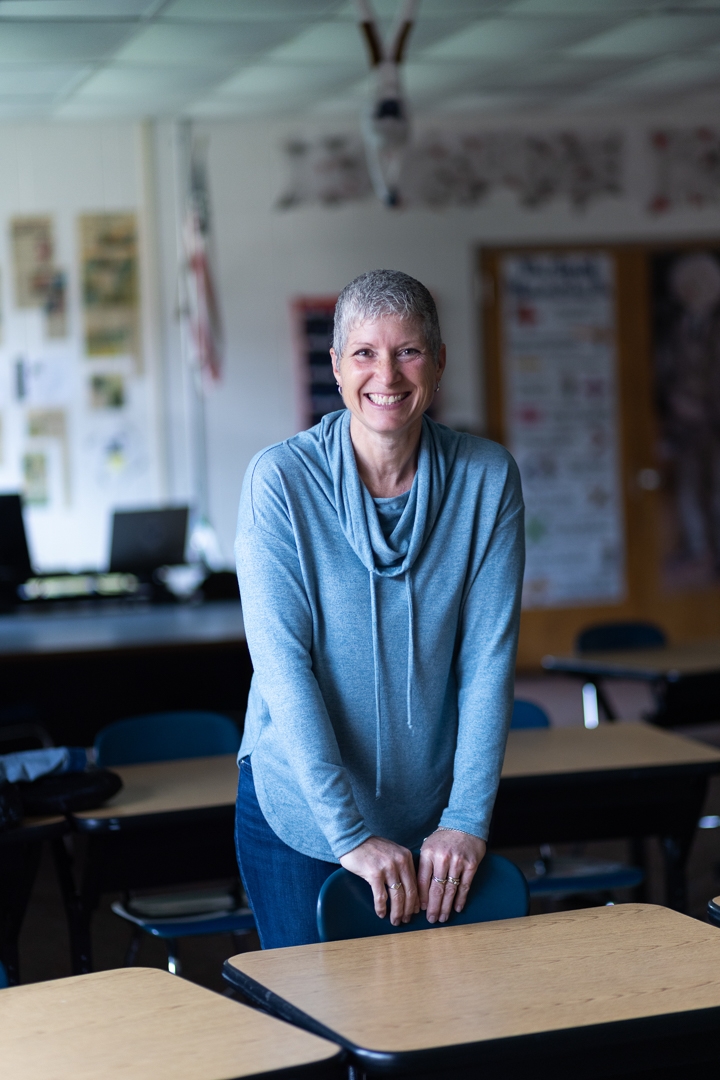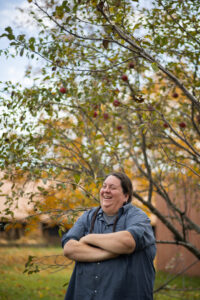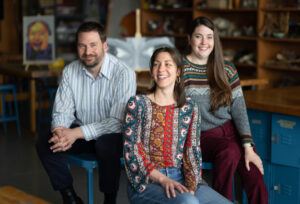I’m not sure what I would do if I weren’t teaching. Sometimes I think maybe architecture, because it’s math and I like design. But I have a memory from second grade, when they talked about jobs — things you want to do when you’re a grown-up — saying ‘I want to be a teacher.’ I can remember when I was young and with my cousins, we would play school all the time.
My teaching debut began when I was in fourth grade. I got to do some extra math in third grade because my teacher recognized that I had a little more math ability, so she let me work ahead. I learned how to do long division. And so when we started learning long division in fourth grade, I raised my hand and said I already knew how. My teacher, Mrs. Wise, let me teach the class. So I’ve been teaching for a really long time.
That moment stands out with Mrs. Wise, when she allowed me that opportunity. I very firmly believe in students having opportunities to explain their thinking and what they know and share their strategies. We talk a lot in math about how there’s not always one way to get there, but how you get there is important. And so a lot of times students will have the opportunity to share what they think or how they did something or a strategy they use. And I think that’s important for their learning. You learn it better when you can explain it to someone else.
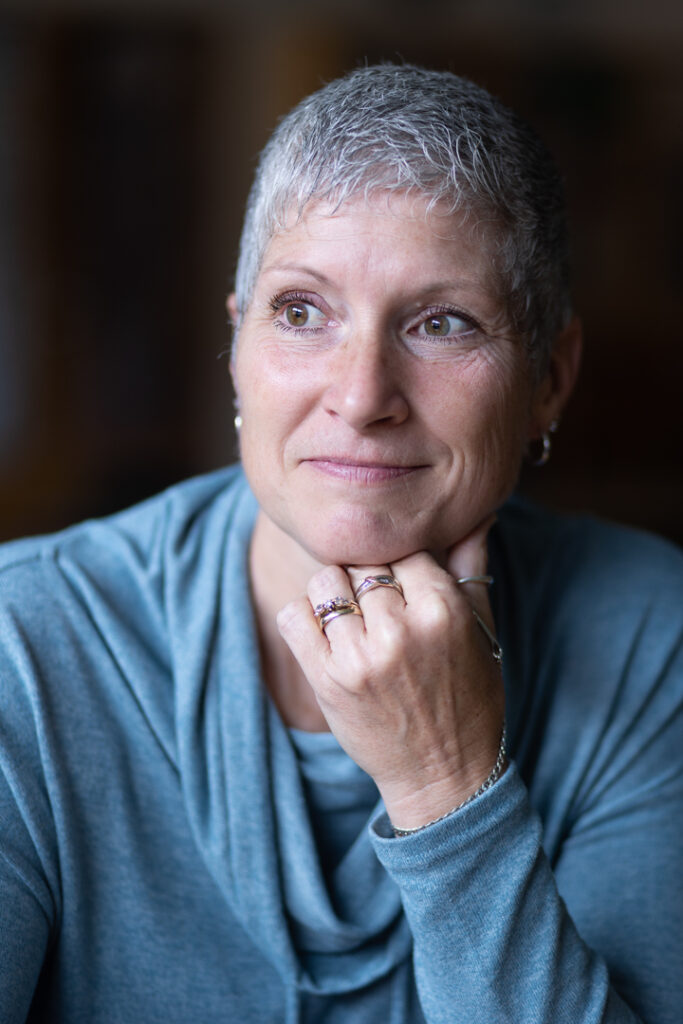
One thing that keeps me going is when students come back and somehow let me know that what I did was impactful for them. Simple things. I’ve gotten thank you notes in my mailbox the following fall, and sometimes those are really motivating. I was speaking to someone at lunch the other day and she said, ‘I often think of this teacher, and I always wonder if I see her at a restaurant, should I go up to her and tell her?’ And I’m sitting at the table going, ‘Yes, yes, you should.’ Because it means a lot to teachers when they know they made a difference somewhere.
I have one student who really sticks out in my mind. I had him in my class when I taught seventh grade, and then he was in my class again when I switched to eighth grade. So I got to have him in my math class two years in a row. And he would do a lot of odd jobs around the room — hanging posters, things like that. We had a lot of discussions in those outside-of-class moments about working hard and sticking with it. He was from a background where there was a lot of potential that he wouldn’t graduate. And so I tried to take every opportunity I could to encourage that.
Sadly, he did drop out in high school. But he came back a year later and re-enrolled himself, and he came to the middle school to tell me that. And he said, ‘I know I shouldn’t have quit. I remember all those times you told me it’s really important to graduate.’ Those are the off-the-cuff conversations that you hope will matter.
He re-enrolled and ended up graduating with the group that would have been the year after him. And that happened to be my younger son’s class. So I was at that commencement, and he came flying up after. He saw me there and said, ‘I told you I would do it!’
Those are the reasons you keep coming back year after year.
Some days are hard, though. I close the door and spend my time with my students in here. And that regrounds me.
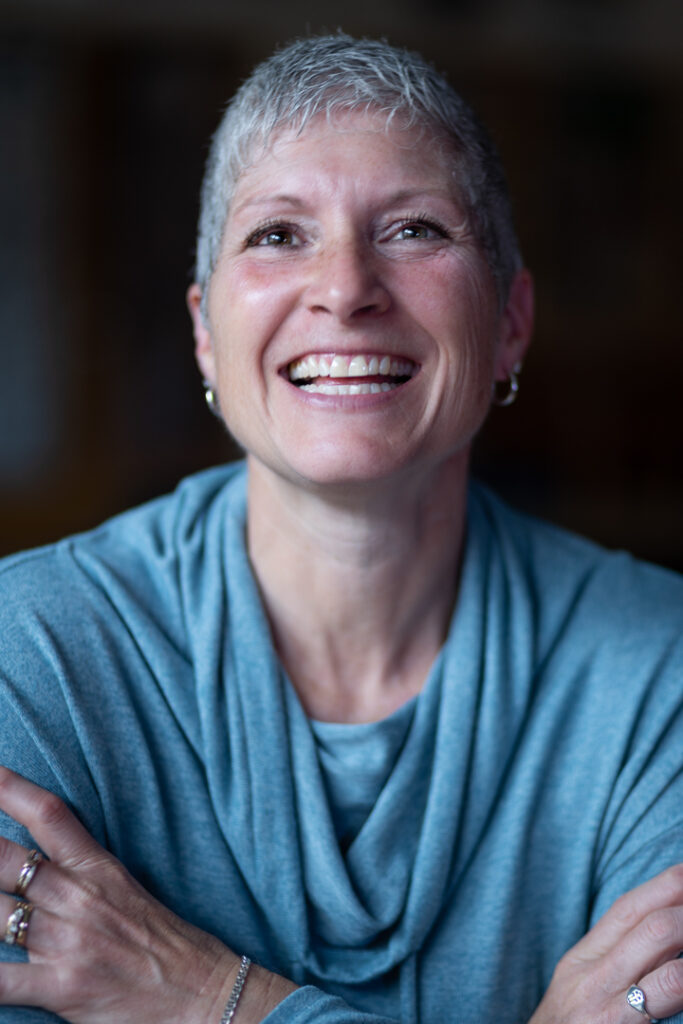
Everything is different about middle school. Everything is different about middle schoolers. I love the students in this building. And it seems to be a love/hate kind of thing, where people either think we’re nuts for doing this and would never do it, or when you’re here, you love it.
I’ve been in this age range my whole career. I wouldn’t trade it for a different one. I love that they are still childlike and childish some days, but so on the cusp of becoming a grown-up. They’re just on that verge. And it’s fun to have those moments where they’re still clearly a child. But to see them hedging toward adulthood — it’s a fun time to watch.
The amount of growth that we see in that three-year time is huge, physically and emotionally and socially. Everything about them changes so much. And it’s a fun metamorphosis to see. It’s fun to witness where they go, from where they start to where they end, and it is definitely a pivotal time in their life. You know that they’re either going to go and know that they have to have the focus to be able to achieve whatever they want when they’re in high school — or sometimes they’re not there yet when they leave, and you hold your breath and hope they make it through.
If I have a student who doesn’t do well, on an assessment or otherwise, I take that very personally. I think that a lot of teachers do. We internalize the successes, failures, emotions and things that are going on for our students. And if you’ve got 20 to 30 students in each class, and you’re taking on all those energies, it’s exhausting. When you get a class that’s challenging, you go home and you are exhausted from trying to figure out how to make it better for them and for you. And when you get classes that are wonderful or students who you can celebrate things with, you get elated about those things. You take on a lot of the emotions of whatever’s happening in the room.
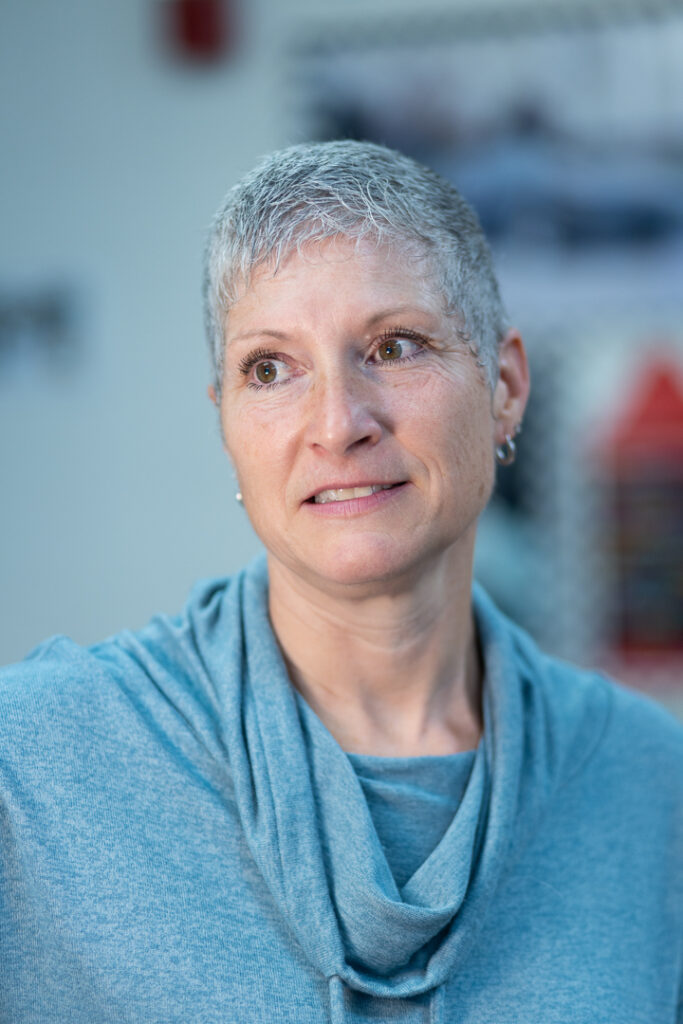
Teaching is a profession, and it takes serious training and ongoing education. I’m concerned about the things that different states are having to do because there aren’t enough people going into the profession. It isn’t a job where you can just walk in the door and do it well. And it’s disheartening to sometimes hear that in the public perception.
It’s not just about content, although that’s important. The kids who come into my room need to learn math. But there’s so much more support that students need while they’re here, with their social skills and their emotional growth and how they fit in, especially in a middle school. And you can’t just come in here and know a lot about math and teach math — you have to know a lot about students, and you have to know a lot about them as people.
When I have student teachers, that’s one of the first things I tell them when they come in my door: your first thing to do is to start building relationships with the students in this room, before I’m going to let you teach content. Because if you only focus on the content piece of things, then the students don’t learn in the same way. They don’t get as much out of what you’re doing. But if you can build relationships with them and get to know them — things that are important to them, things that matter to them — then I feel like you can teach them anything.
It takes a lot of education. And it takes a lot of practice. And it’s an ongoing process. This is my 31st year, and I will not do things exactly the same way that I did last year. As teachers, we’re constantly tweaking and improving and evaluating ourselves. We never stop learning.
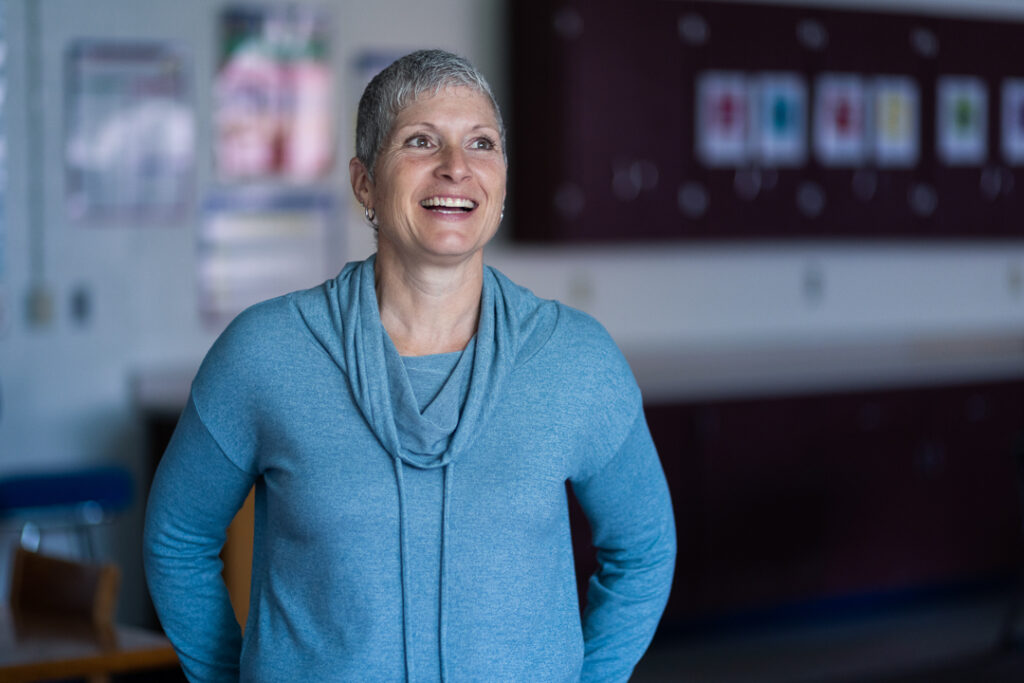
I think when you’re a new teacher or in that student teaching phase, one of the things that comes up a lot is that there are just so many things to think about in the day, and you don’t realize how many things you have to be thinking about simultaneously. You have to build this space in your head for an awareness of a lot of things happening all at the same time.
You focus all this energy on, ‘What’s my lesson? And how am I going to do this lesson with the students to get the most out of them that I can?’ Then as you’re going about your lesson, on paper or in your head, it’s always going so beautifully. But then you get in front of students, and you realize that you’ve got one student who’s been in tears for two hours this morning already and really isn’t very focused to learn, no matter how good your lesson is. And you’ve got these other two kids in a corner who want to chit chat the whole time. And you’ve got someone else who forgot to take their ADHD meds, and so they’re so squirrely, they’re practically on the floor. Or you’ll be in the middle of it, and things will be going great, and then you’ll have a fire drill that no one told you about.
There’s a million things and you’re constantly in your head, assessing and watching and reevaluating, and taking the vibe on where the students are and who needs a little extra support, who needs you to go stand by their desk instead of where you are. It’s a lot, and it takes a few years, for sure. A few years to get to the point where your responses to those things become more automatic and you don’t think so hard.
It’s kind of like when you learn to drive a car, especially if you’ve ever learned to drive a stick. When you first learn to drive a car, you’re thinking about everything: you’re thinking about staying in between your lines, you’re thinking about the car that’s passing you either oncoming or on your left, and you’re thinking about all the signs that you’re looking at. And it’s really scary. Your brain tells you it’s too many things to think about all at once. And when you start teaching, it’s very much the same way. There’s a lot to think about in a day. And I think sometimes that’s where people lose their confidence. They feel like, ‘Oh, that was a terrible lesson. That was a disaster.’ But it’s okay.
I had a mentor — my best mentor my first year — who would say, ‘But nobody died.’ It does make you laugh, but it’s true. If one lesson or a part of a lesson doesn’t go the way you wanted it to, it’s not the end of the world, and nobody died.
You have to wrap your brain around a lot of different things when you start, and I think that’s probably the most overwhelming piece of it — that you don’t realize how many things you have to be thinking about simultaneously.
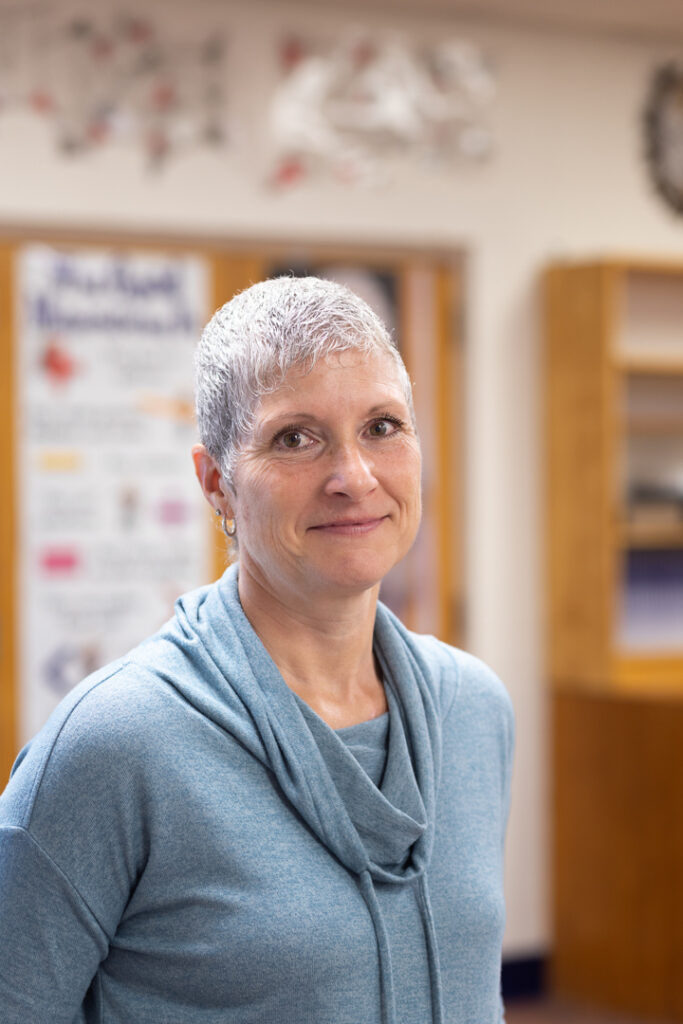
I think teacher autonomy is a huge way to keep more teachers in the profession. And it varies state to state, district to district, building to building. A lot of it depends on district-level or building-level leadership.
Sometimes too much gets handed down or placed on teachers’ plates without teacher input. And if we’re the ones who have to pull it off or carry it out in the classroom, we should be part of that conversation. We are the ones who are trained to work directly with the students, and we are so underutilized in that way.
One time we sat in a meeting and the teachers were told, ‘This is what we need to accomplish.’ And then the administrator stepped out of the way, and when he came back to see how things were going, we said, ‘We’re done. We’ve got this.’ And he was kind of amazed. Well, if you tell a group of teachers what needs to happen, and then you get the heck out of their way, we’ll find a way to do it. You just need to tell us where you need us to go and then let us get there, because we know how we can make it happen. And that needs to happen more.
I feel very fortunate that in my 31 years, my building-level principals have given us a lot of autonomy, within whatever they’re being given the autonomy to allow us to do. There are layers, where administrators can’t provide autonomy unless it’s given to them too.
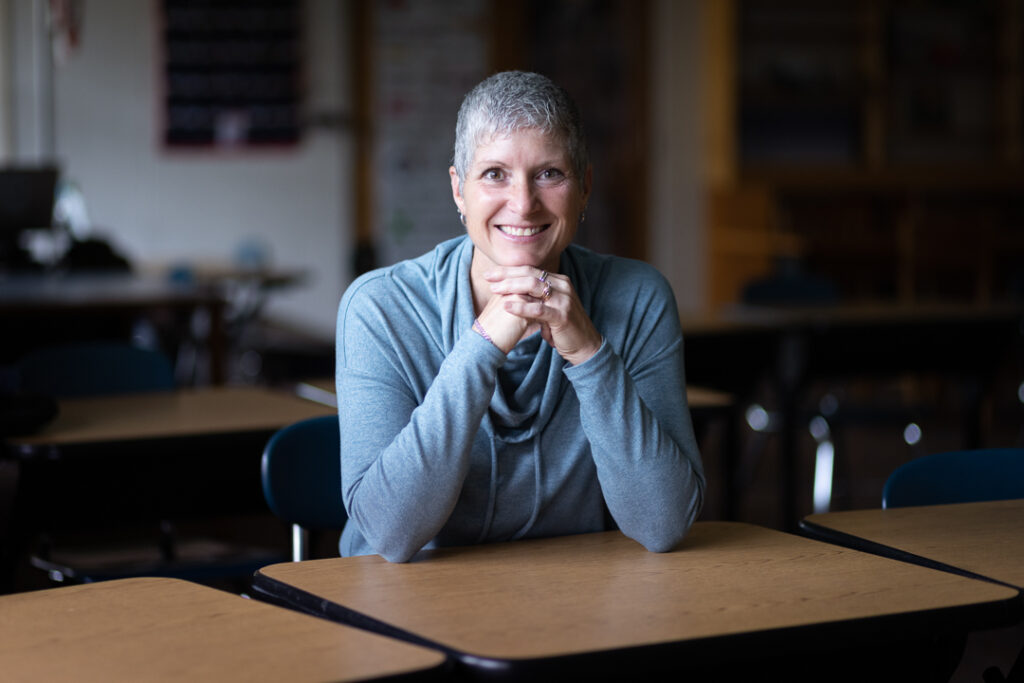
There are things in education that could be better. There are also a lot of great things happening that people don’t look at or don’t want to see because they want to send a bigger message, especially when it comes to public education.
I think we need to focus on the things that are going well. There’s still a lot of learning that happens in schools, there are still a lot of great relationships that are forged in schools. There is still a lot of growth happening for students. And I think that sometimes the public messaging is so focused on the negative things that we miss all the good.
I would tell someone who’s going into education that if you feel like you’re called to do it, then you need to get in there and give it a chance. And when you get in there, you need to try to focus on the good things that happened today — not that negative things are never going to happen. And not that there aren’t going to be things that need to be fixed, because there are things that need to be fixed. But if you can take the perspective that we’re going to work on this, and we’re going to collaborate and not silo ourselves, that’s really the only way to move the needle forward or to change the direction. Teaching is never a one-person job. It is so important for teachers to work with other teachers and try to solve problems together.
I’m a firm believer that if legislators at the state or national level are going to be making educational decisions, there should be a table full of educators representing states there. There are groups of educators who would be more than happy to be there at the table. If you want to fix something, you’ve got to ask the experts how it operates from the start and not make assumptions about what’s going on.

Last year, coming off the COVID year, we did some things in our building to try to address that we knew there were some kids who weren’t as engaged and were lagging from where we would like them to be. We weren’t sure what our protocols were going to be and what COVID would do once everybody was back in school, so we started cautiously, and we formulated small groups. So I had a very small class of ten eighth graders who were really struggling with math. And the goal was to pull them together in a class to give them opportunities for a lot more one-on-one time and to try to push that forward.
By the end of the year, I was so amazed at how far they had come. I had a student who got his first C ever in math. He was elated. I know that doesn’t seem like a grand thing. But if you’re a student who has had D’s and F’s in your math forever — that was huge, to get him to care enough to put in that effort to really try to learn things and to believe that he could. So for me, sometimes it’s those personal joys, those little victories that happen within the room.
Last year we had close to 30 students from out of the country, non-English-speaking, come to our middle school. There were two teachers who worked really closely with these newcomers. And, you know, they ended up being one of the biggest growth groups in the state testing and in the data that we had. Great things are happening all the time.
Kids are still graduating in high numbers. We’re learning a lot more about watching students and making opportunities for them to go to trade schools or to tech schools, as opposed to four-year college as the be-all and end-all. We all know college is great, but sometimes going to get your plumber’s licensing is great and you’ll make more and have less debt. We’re learning a lot of things like that. And I think when you look at the big picture, kids are still learning. Kids are still thriving.
There’s a lot more to be aware of these days. There’s a lot more scary stuff going on in schools now. And the fact is that kids are still learning, they’re still growing, they’re still surviving, they’re still thriving. The joy comes in both ways: sometimes big celebrations and sometimes the little things. If I have a student who didn’t think they could do something do something and be proud of themselves about it, that’s huge for me. And for me, that’s joy.
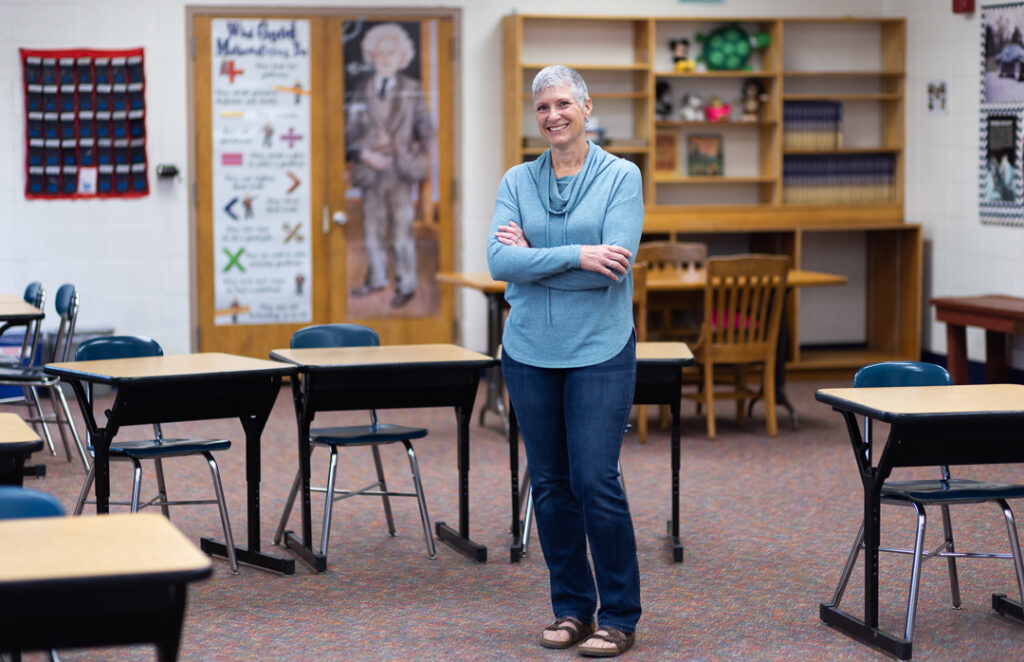
It is my hope for education and for the teaching profession that we, in this country, don’t continue to allow the rhetoric and the negativity to continue to the point where we talk quality future educators out of being educators. I think that so much of what’s being said now, if it continues in the way that it’s been going, and if it progresses at the rate that it has been progressing, I think we’re going to talk ourselves right out of an education system. And I know that there’s this perception that we should privatize education and do away with it and that it’s going to be so much better. But it’s not going to be better if you don’t have teachers.
I’ll be bold: I think educators are vastly underpaid. Considering professions with similar education levels and the amount of training that we need to have — the amount of things that we need to do and think about in a day, the amount of ongoing education that we have to have. I think that it would be helpful for the profession, to keep teachers in it, if there were equitable pay. And when I say equitable, I mean measure it with professionals who have the same kinds of requirements in terms of their training and expertise. And if you really want the best, then you’ve got to have those high levels of expertise expected — but then pay for it.
I don’t think I’ll see that in my time, being that this is my 31st year, but I can certainly be an advocate for that for as long as possible.
–Diana Callope
Math Teacher in Whitewater Unified School District
Whitewater, Wisconsin
